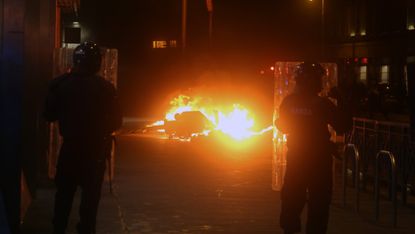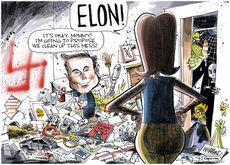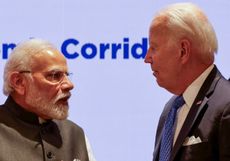Dublin riots: a blow to Ireland’s reputation
Unrest shines a spotlight on Ireland's experience of mass migration

Ireland had long seemed resistant to the growing anti-immigrant sentiment seen across Europe, said Rory Carroll and Lisa O'Carroll in The Guardian.
Today, one-fifth of the Republic's population of five million was born elsewhere – a "seismic" but largely painless transformation that has occurred since the 1990s. Thanks in part to its own long history of emigration, Ireland prided itself on greeting foreigners with céad míle fáilte – a "hundred thousand welcomes".
But that seems to have changed. Last Thursday, a naturalised Irish citizen of Algerian origin stabbed three children and a woman outside a school in central Dublin, and within hours, "all hell had broken loose". Anti-immigrant protesters gathered, chanting xenophobic slogans: "Get them out", "Enough is enough". The worst riots in Dublin's recent history followed. Nearly 50 people were arrested, and dozens injured. Three buses and 11 police cars were set on fire. The events "scorched the notion of some progressive Celtic nirvana".
Subscribe to The Week
Escape your echo chamber. Get the facts behind the news, plus analysis from multiple perspectives.

Sign up for The Week's Free Newsletters
From our morning news briefing to a weekly Good News Newsletter, get the best of The Week delivered directly to your inbox.
From our morning news briefing to a weekly Good News Newsletter, get the best of The Week delivered directly to your inbox.
'A pressure valve for discontent'
That idea has long been a liberal delusion, said Tim Stanley in The Daily Telegraph. A recent poll found that 75% of Irish people think there are "too many" newcomers. Protests against centres for asylum seekers happen almost weekly, and placards bearing slogans such as "Ireland is full" are widely seen; the arrival of about 100,000 Ukrainians has added to tensions. Despite the "sense of moral superiority" among its elite, Ireland's experience of mass migration has been very similar to Britain's, but without parties such as UKIP acting as "a pressure valve for discontent".
This isn't just about migration, said Ian O'Doherty in The Spectator. The area where the trouble started – Dublin's north inner city – has long been seen as "bandit country", known for its drug dealing and feuding gangs. It has spent the past few years in a "cycle of decay and despair"; lockdown and austerity have helped to make it "a powder keg".
'They do not speak for us'
This riot is not "an expression of where Ireland is or who we are", said Fintan O'Toole in The Irish Times. Yes, there are tensions as the country struggles to cope with refugees amid a housing crisis, but that doesn't mean that anti-migrant sentiment is seething across the nation (there has been much praise for the Brazilian immigrant who stopped last week's stabbings).
And yes, there are problems in north Dublin, but it's very unfair to blame its community for last week's events. The rioting was organised by a tiny gang of far-right "fascists", aided by a few hooligans. "These pitiful thugs are not us. They do not act for us, speak for us or burn buses for us."

Continue reading for free
We hope you're enjoying The Week's refreshingly open-minded journalism.
Subscribed to The Week? Register your account with the same email as your subscription.
Sign up to our 10 Things You Need to Know Today newsletter
A free daily digest of the biggest news stories of the day - and the best features from our website
-
 5 X-plosive cartoons about Elon Musk
5 X-plosive cartoons about Elon MuskCartoons Artists take on his proposed clean-up of X, his views on advertisers, and more
By The Week US Published
-
 2023: the year of superhero fatigue
2023: the year of superhero fatigueThe Explainer The year may represent the end of an era for Hollywood
By Brendan Morrow, The Week US Published
-
 Recipe: roast garlic mushrooms with parsley and eggs by Gelf Alderson
Recipe: roast garlic mushrooms with parsley and eggs by Gelf AldersonThe Week Recommends A simple and classic breakfast combination
By The Week UK Published
-
 Worklessness: a national 'scandal'
Worklessness: a national 'scandal'Talking Point One in five working-age adults in Birmingham, Glasgow and Liverpool are neither in work nor seeking work
By The Week UK Published
-
 Alleged Sikh assassination plot rocks US-India relations
Alleged Sikh assassination plot rocks US-India relationsTalking Point By accusing an Indian government official of orchestrating an assassination attempt on a US citizen in New York, the Justice Department risks a diplomatic crisis between two superpower
By Rafi Schwartz, The Week US Published
-
 Henry Kissinger dies aged 100: a complicated legacy?
Henry Kissinger dies aged 100: a complicated legacy?Talking Point Top US diplomat and Nobel Peace Prize winner remembered as both foreign policy genius and war criminal
By Harriet Marsden, The Week UK Last updated
-
 The Supreme Court could reign in the SEC — and federal agencies as a whole
The Supreme Court could reign in the SEC — and federal agencies as a wholeTalking Point The court is hearing arguments on the agency's ability to enforce financial penalties
By Justin Klawans, The Week US Published
-
 Is the Ukraine government and its military on brink of a split?
Is the Ukraine government and its military on brink of a split?Today's Big Question Public spats between President Zelenskyy and his military chief have contributed to declining morale within Ukraine
By Richard Windsor, The Week UK Published
-
 America doesn't have a wealth tax. The Supreme Court might kill it anyway.
America doesn't have a wealth tax. The Supreme Court might kill it anyway.Talking Point Justices are being asked to do something unusual: issue opinions about hypothetical legislation
By Joel Mathis, The Week US Published
-
 How a long-term truce in Gaza could have ripple effects across the Middle East
How a long-term truce in Gaza could have ripple effects across the Middle EastTalking Point Israel and Hamas have recently agreed to extend their peace for two more days
By Justin Klawans, The Week US Published
-
 Sunak's migrant deal with Braverman: a drift from 'proper' political process?
Sunak's migrant deal with Braverman: a drift from 'proper' political process?Talking Point PM allegedly promised tougher immigration measures in leadership deal with former home secretary
By Sorcha Bradley, The Week UK Published










